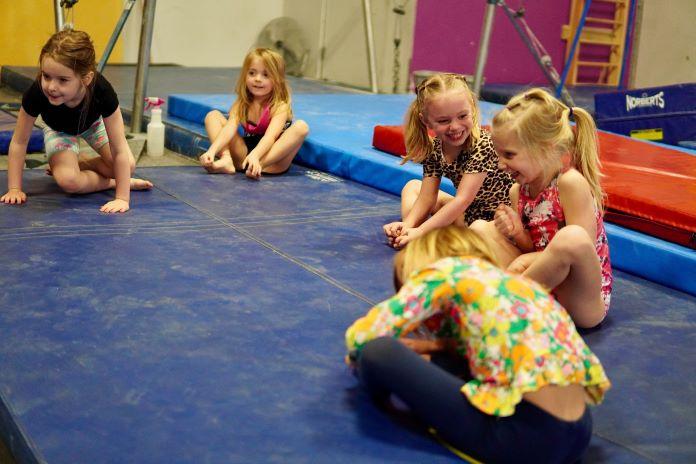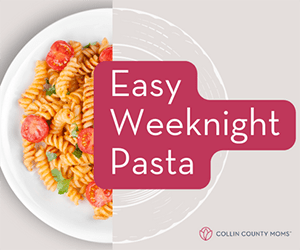 Before I was “Mom,” I was “Coach Jenn.” For more than a decade, I taught athletes tiny and tall to cartwheel, flip, and point their toes. I enjoyed sharing my love of gymnastics as much as I enjoyed the kids I coached.
Before I was “Mom,” I was “Coach Jenn.” For more than a decade, I taught athletes tiny and tall to cartwheel, flip, and point their toes. I enjoyed sharing my love of gymnastics as much as I enjoyed the kids I coached.
When I became a mom, I couldn’t wait to enroll my son in gymnastics! I wanted him to explore movement and build coordination in a fun, safe space. Although gymnastics was short-lived for my son (he only wanted to build block towers), I gained valuable perspective from the parent side.
Before selecting a gymnastics program for your child, do your research and be prepared with what to ask and look for.
Mom Questions
Sports programs are one of the top questions I see in mom groups. The pressure to enroll kids at younger ages coupled with volume of options can be overwhelming.
DFW has an abundance of wonderful gymnastics programs and choosing the right one for your child can be tough.
>> RECOMMENDED RESOURCE :: Guide to Extracurricular Activities for Kids in DFW <<
Background & Programs
Artistic gymnastics is the sport most people are familiar with and the focus of this article. USA Gymnastics (USAG) is the governing body.
Gymnastics has three main programs, including Junior Olympic (JO), Xcel, and recreational (“rec”). Here are brief descriptions of each program.
- JO is the traditional competitive program. Athletes can progress through Compulsary (levels one to five), Optionals (levels six to 10), and Elite (junior and senior) during their gymnastics career. At the higher levels, gymnastics often train 30 to 40 hours per week. Some gyms have an onsite home school program to allow adequate study and training times.
- Xcel is a newer alternative competitive program. The goal of Xcel is for gymnasts with a range of skills and commitment levels to have a rewarding gymnastics career. Athletes in the Xcel program may participate in other activities as training hours are about half of the JO program (on average).
- Rec programs are designed for kids across all ages and skill levels. Most kids attend one to two classes per week for a few hours total. These programs have levels for advancement and sometimes offer a mini-meet or showcase.
Most gymnasts begin in rec programs, even Olympians. I recommend starting with one or two classes per week to gauge your child’s interest and physical ability.
Tips to Remember
I’m sharing my top tips and criteria as coach and mom to help you navigate gymnastics programs near you. Keep in mind, no singular perfect program exists for all kids. Focus on what works for your child and meets your expectations as a parent.
- Remember it’s all about having FUN! A former boss always said, “If you take the fun out of gymnastics, you’ll take the kid out of gymnastics.” This is true for athletes at all levels.
- Check your expectations. Do not enroll expecting your child to make an Olympic team. This is one of the top faux pas parents make as it puts unnecessary pressure on the kids and coaches. You should expect progress at your child’s own pace.
- Do not criticize or coach outside of class. Your child’s interest and effort can vary, even class to class. Be a positive supporter and follow your child’s lead.
>> RECOMMENDED READ :: Extracurricular Activities for Kids in DFW <<
Coach’s Criteria
- Credibility is my number one criterion. Coaches should be safety and first aid certified and receive regular training to improve their skills. The gym should be visibly safe (mats, padding, etc.) with appropriate liability insurance and protocols for onsite injuries.
- Programs are a close second. Gyms are known for the quality of their programs. Research gyms and programs with your child in mind. The goal is to set them up for success and fun!
If you’re unsure what to ask, here’s three questions to start.- How are skills assessed and how do athletes advance?
- Do coaches provide regular feedback to parents? (This may vary by age.)
- Are classes designed for seasonal or year-round athletes?
- Are showcases or mini-meets available for rec athletes?
- Look at the gym layout. Young children need a distinct space to keep them safe and minimize distractions. Preschoolers are notorious for being “runners” who try to join other classes. This is a safety risk to all athletes. I prefer preschool/pre-k classes to have a physical barrier from the rest of gym. White “fences” are common in gymnastics gyms to divide spaces and fit these criteria.
- Review the gym policies. Be informed about policies for missed classes, class cancelations (due to weather or a sick coach), and unenrollment. Also ask how missed payments are handled and if enrollment is impacted.
- Read reviews across several platforms. Look at dates as rec programs tend to employ younger coaches, which impacts turnover. Also look for insight into how athletes are treated, and the relationship parents have with coaches. Consider opinions but do not make decisions based on reviews alone.
Trial Class
If you’re on fence about a program, ask to trial a class. Observe the coach’s demeanor and how athletes respond. Ask other parents about their experience with the gym. After class, ask the coach for feedback and recommendations for specific classes (dates/times) and coaches. Talk with your child at home about their desire to participate again. (You may be surprised!)
Confidently Decide
As a former coach and mom, I can confidently say no gym will make every parent and athlete happy. Options exist for a reason. Utilize my criteria to narrow your options and confidently choose a gymnastics gym.
Focus on your unique athlete. But remember my number one tip: Have fun!













